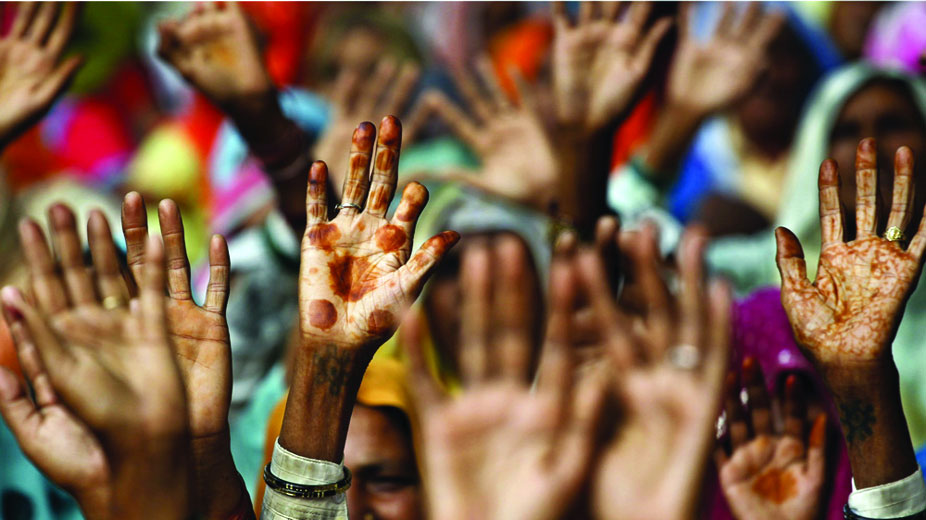Asma Bibi is an example for those women who give up their dreams never to lose heart. Everyone has the potential to become someone great, writes Sadaf Zareen
Sometimes it is important to dream big. It can be more exciting than just possessing bookish knowledge in order to do some work and be successful in life. Often, people remain confined to the four walls of their house because they feel that they cannot do anything in life and people will mock them. This tendency is mostly seen in women. Women, especially in the rural areas, are victims of this mentality. And this mentality is because of the social environment, where due to lack of education, women are considered to be objects of sexual pleasure and reproduction. This is a major reason for women not even dreaming of moving forward. Education is very important for women and our society is not very successful in providing education to women.
Education is an important factor for the advancement of any society. On one side, it explains the difference between good and wrong, on the other, it arouses curiosity in the mind. History has many examples, in which educated women have played an important role in preparing social structures with enthusiasm. But despite knowing the achievements of women over the years, the present stratum of society makes fun of them and their achievements instead of idolizing them. Nevertheless, there are many women like Asma Bibi who, despite being uneducated, have been able to make their own distinct identity in society. Asma, who lives in a small village in Rohtas district of Bihar, is totally uneducated. She cannot read or write even a single alphabet in any language, but through her own initiative, she has not only created an identity for herself in the but also become an example of women's empowerment.
The parents of 50-year-old Asma, living in Akbarpur village, located at Dehri in Rohtas district, were illiterate. Being illiterate themselves, they kept their daughter away from acquiring any form of education. Asma was married at an early age and she had six children one after another. Her husband started spending all the household earnings on liquor and also used to beat Asma when she would refuse to give him money. Somehow life was carrying on despite all the problems when suddenly one day her eldest son went missing. Her husband also went away to the city in search of a job and never returned home. Even in this difficult situation, Asma did not give up hope. She kept on trying to find her son. After losing both husband and son, she took up the responsibility of improving the condition of her home and raising her remaining five children. She started doing sweeping and swabbing in houses and with that money she started buying women's makeup items and other women's accessories from the city and selling it in the village. Even though she could not read the name of the station, Asma used to go to Ferozabad to buy items at cheap rates. At the same time, she started traveling further and further in the hope of finding her son.
Asma was very keen to learn how to read, whether it was in Hindi, English or Urdu. People used to make fun of her when she said the words wrong, but Asma never got angry or discouraged. She felt the sense of a lack of education in her life and the difficulties she faced because of being uneducated. This was the reason that she was determined to give her children a good education. Along with managing the expenses of the house, she started raising money for her children's education. She enrolled her three daughters in school and sent her two sons to a large Madrassa (Institute for Islamic Studies) in Aurangabad to receive religious education. Despite being uneducated, she used to run everywhere and get admission forms and new updates about the schools and colleges. She would even ensure she found out about scholarships and other government schemes to be able to provide her children with the best education.
Asma, without any support from anyone, has changed her own living conditions but also that of her children's. This she did through her courage, hard work and enthusiasm. The circumstances in which they live today have changed completely from what it was earlier. She made sure that her daughters completed their graduation. She was able to get her daughters married into good families because they were well educated. Eight years later, finally, her missing son has also returned home, to help him earn a living. Asma has taken a loan from people to send him to Saudi Arabia to work there. The younger son is a Hafeez (one who recites the Holy Quran by heart). Her desire to read is still very much alive even today and that is why she is completing her incomplete dream by learning to read the Quran. She learnt Urdu from her son.
Asma today has become an example for those women who give up their dreams and lose heart by throwing their desires of becoming someone great or of achieving knowledge. Thinking of themselves to be weak, they allow people to exploit them, both physically as well as mentally. The importance of education and the right of women in society is not understood. However, with changing times this mentality of society is gradually changing. But there is still not much of a change in the situation in the rural areas. In such a case, the positive success story of Asma Bibi will definitely prove to be a morale booster to many women and will help them realise their unfulfilled dreams.
(Charkha Features)


























